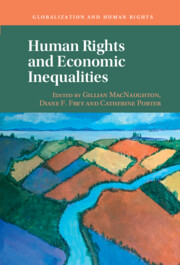Book contents
- Human Rights and Economic Inequalities
- Reviews
- Globalization and Human Rights
- Human Rights and Economic Inequalities
- Copyright page
- Dedication
- Contents
- Figures
- Tables
- Boxes
- Notes on Contributors
- Acknowledgments
- 1 Introduction
- Part I Conceptualizing and Measuring Human Rights and Economic Inequalities
- 2 Emerging Human Rights Norms and Standards on Vertical Inequalities
- 3 Constraints on Economic Inequality: Comparing Canada and the United States
- 4 What the UN Human Rights Treaty Bodies Tell Us about Economic Inequalities and Human Rights: An Empirical Analysis of Twenty Years of Practice
- 5 How Can Economists Help Human Rights Practitioners to Measure Changes in Economic Inequalities?
- Part II Causes and Consequences of Economic Inequalities
- Part III Socioeconomic Rights and Economic Inequalities
- Index
- References
2 - Emerging Human Rights Norms and Standards on Vertical Inequalities
from Part I - Conceptualizing and Measuring Human Rights and Economic Inequalities
Published online by Cambridge University Press: 29 September 2021
- Human Rights and Economic Inequalities
- Reviews
- Globalization and Human Rights
- Human Rights and Economic Inequalities
- Copyright page
- Dedication
- Contents
- Figures
- Tables
- Boxes
- Notes on Contributors
- Acknowledgments
- 1 Introduction
- Part I Conceptualizing and Measuring Human Rights and Economic Inequalities
- 2 Emerging Human Rights Norms and Standards on Vertical Inequalities
- 3 Constraints on Economic Inequality: Comparing Canada and the United States
- 4 What the UN Human Rights Treaty Bodies Tell Us about Economic Inequalities and Human Rights: An Empirical Analysis of Twenty Years of Practice
- 5 How Can Economists Help Human Rights Practitioners to Measure Changes in Economic Inequalities?
- Part II Causes and Consequences of Economic Inequalities
- Part III Socioeconomic Rights and Economic Inequalities
- Index
- References
Summary
Everyday there is more news about alarming disparities in income and wealth from around the world. One day we learn that the CEO of Disney earned 1,424 times what the median worker in that company earned (Stanley-Becker 2019). The next it is the impact of COVID-19 on billionaires self-quarantining on their private yachts versus workers carrying out essential services without paid sick leave and often for less than a living wage (Collins 2020). The portrait of glaring inequality and injustice described in the daily news is profoundly disturbing. It is also a stark contrast to the vision of the Universal Declaration of Human Rights, a commitment of all UN members to respect and promote all human rights – civil, political, economic, social and cultural – for all. Deep concern about extreme and growing economic inequalities have led some human rights scholars and practitioners to ask what role, if any, human rights has played in contesting such inequalities or could play in reversing this four-decade trend (Alston 2015; Alston and Reisch 2019; Balakrishnan, Heintz and Elson 2016; Brinks, Dehm and Engle 2019; CESR 2016; MacNaughton and Frey 2018; Moyn 2018)? What international human rights norms and standards address economic inequality, and what guidelines can be drawn from emerging work of the UN human rights mechanisms, scholarship and practice on human rights and economic inequalities?
- Type
- Chapter
- Information
- Human Rights and Economic Inequalities , pp. 33 - 62Publisher: Cambridge University PressPrint publication year: 2021



